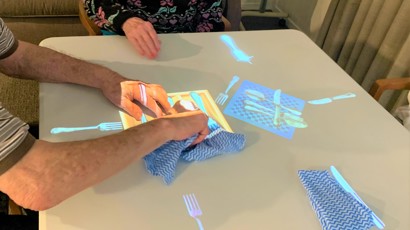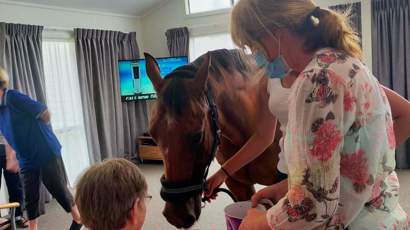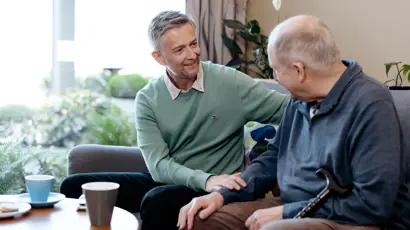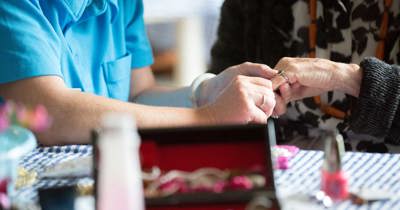Yes, you are able to stay overnight with family and friends. Our nursing staff or manager will help organise your personal requirements so you can have an enjoyable break.
Life in a care home
-
If I live in a Bupa care home, can I stay overnight with family or friends?
-
What is a map of life?
Your map of life is a picture board we create with you, to tell everyone who cares for you who you are and what is important to you.
-
How do I visit the doctor?
We have our own general practitioner (GP) who visits the care home regularly. You will be scheduled to be seen by them on a regular basis. If you wish to have a visit from the GP at other times, please let the registered nurse know. You are welcome to retain your own doctor, if they are happy with this arrangement. However, your GP may not be available out of hours and for any acute or after hours medical assessments, which means we may need to contact one of our on call doctors should your own doctor not be available. There may be additional charges if you choose to retain your own GP.
-
How will I get my medication?
Our care home has an agreement with the pharmacy to dispense your medications. This involves a coordinated order and supply system and includes individually packaged doses to provide safe and reliable dispensing of medications. Some medications incur a cost if they are not fully subsidised. This cost is not covered in our agreement and will be passed on to you. If you wish to manage your medications yourself, you will need a note from your doctor confirming this. Medications must be stored in a locked drawer in your room.
-
Can I practise my own cultural beliefs?
Residents from all religious and cultural affiliations are welcome at our home. When we are developing your care plan with you, we will ask about your specific spiritual and cultural needs. Arrangements can be made for you to continue to practise your faith and remain in contact with your place of worship or religious group. Please discuss this with a member of staff. Relatives and friends are welcome to take you to your regular place of worship.
-
What happens during a fire emergency?
Our care home is fitted with fire prevention and safety equipment. Our team are trained in fire and emergency response and evacuation procedures. If you discover a fire, you should activate the 24 hour call system to inform staff, who will follow the emergency procedure or raise the alarm using a fire alarm call point (if not already activated by the automatic fire detection system).
-
Can I smoke?
Should you have any specific needs, please discuss these with the care home manager.
-
Who provides the furniture in my room?
We will provide a bed, bedside table and wardrobe and drawers to store your clothes. You are welcome to bring your favourite furnishings or some personal items with you to make your room your own. We encourage you to bring your own belongings such as pictures and books. For safety reasons, we do not allow items such as candles, incense or aromatic oil burners into the home, as they can create a fire risk.
-
Can I bring electrical appliances such as a radio?
For safety reasons, all electrical equipment you bring into a home must be tagged and certified as safe. If your electrical equipment requires testing, we will arrange to have this done for a small charge.
-
Is there a phone in my room?
Private phones and computers can be connected in your room and you are also welcome to use your own mobile phone. There are telephones available for your use and our team are happy to provide assistance if needed. You are responsible for the installation and on going usage costs of any private phone or computer.
-
Can I entertain friends and family in my room?
Our care home has communal lounge and dining spaces. We also have gardens and outdoor seating areas. Our communal spaces can often be booked for special celebrations. Please talk to our team about your needs.
-
What kind of food is served?
Our care home has a kitchen manager who is responsible, with their team, for providing a menu that gives as much choice as possible for breakfast, lunch and evening meals. Special requirements such as vegetarian, diabetic, low fat, low salt or weight reduction diets can be provided. Please advise us prior to your admission if there are any cultural or other preferences you may have.
-
Can I drink alcohol?
If you wish to drink alcohol you may do so, however we ask that you speak to a senior member of the team, to make sure it won’t upset your diet or medications.
-
How is my laundry handled?
We have a laundry service available for your personal clothing. All linen is provided and laundered by our care home. Your clothes must be named to make sure they are returned to the correct person. Sewn or iron on labels are very effective. Please ensure that any new items are labelled. We aim to provide a high quality service, however please bear in mind that the lowest machine washable temperature is 35˚ C. We cannot hand wash items and suggest relatives or friends launder any delicate clothing.
-
Where can I go to get my haircut?
Our hairdresser visits the home on a regular basis. Please ask the registered nurse or refer to the notice board for specific hairdressing days, times and charges.
-
How will I spend my day?
We encourage you to keep doing the kind of things you did before moving into our care home. Our activities team provide a varied programme of activities and special events e.g. arts and crafts, easy exercise, music sessions, quizzes and games. There may be times in the day when you choose to occupy yourself, possibly listening to music, reading or doing a puzzle. Please let us know if there is anything we can do to make sure you get enough quiet time. There are always impromptu activities such as chatting with other residents, helping with tasks or gardening around the home, visiting the local shops or library, or getting your hair or nails done.
General questions
-
How do I come into your care home?
Visit your GP and ask them to refer you to the Needs Assessment Service Co-ordination (NASC) team from your local hospital. They will visit you in your home to understand the level of care you will need.
-
What is a care plan?
A care plan is a plan that is focused on who you are and what you like. We learn about how you like to spend your day and the routines you prefer. We will understand your personal preferences and what brings you joy, as well as your nursing requirements. Our aim is to get to know you well. With your agreement, relatives and friends are encouraged to be involved in creating your care plan too.
-
What is a map of life?
Your map of life is a picture board we create with you, to tell everyone who cares for you who you are and what is important to you.
-
Can I practise my own cultural beliefs?
Residents from all religious and cultural affiliations are welcome at our home. When we are developing your care plan with you, we will ask about your specific spiritual and cultural needs. Arrangements can be made for you to continue to practise your faith and remain in contact with your place of worship or religious group. Please discuss this with a member of staff. Relatives and friends are welcome to take you to your regular place of worship.
-
What happens during a fire emergency?
Our care home is fitted with fire prevention and safety equipment. Our team are trained in fire and emergency response and evacuation procedures. If you discover a fire, you should activate the 24 hour call system to inform staff, who will follow the emergency procedure or raise the alarm using a fire alarm call point (if not already activated by the automatic fire detection system).
-
What kind of food is served?
Our care home has a kitchen manager who is responsible, with their team, for providing a menu that gives as much choice as possible for breakfast, lunch and evening meals. Special requirements such as vegetarian, diabetic, low fat, low salt or weight reduction diets can be provided. Please advise us prior to your admission if there are any cultural or other preferences you may have.
-
Can mail be sent to me at the care home?
Mail addressed to residents will be delivered unopened. We can also post any stamped letters or parcels for you.
-
Do I need insurance for my personal things?
You need to arrange your own insurance, if it is required, for your personal items. Certain small items can be deposited in the home’s safe. These should be sealed in an envelope marked with the date and your name.
-
What if I have a complaint?
At Bupa, we do our best to get things right, but if you have any concerns we’ll do our best to fix them alongside you. We encourage you to speak directly to your care home general manager about your complaint or suggestion. You can also complete a feedback form.
This form is also available in the reception area or from your care home general manager and can be placed in the box at reception. There is more information about the complaint process in your admission agreement.
Funding, billing and costs
-
Who pays for my care?
Typically, who pays your monthly charges is a combination of you, your private funds/superannuation, Te Whatu Ora, and any subsidies you may be eligible for. Actual costs will vary between care homes and depend on your individual circumstances.
-
What if I need funds or want to buy something?
Your personal funds are held for you in a Comfort Account. Your personal funds for use in the care home will be overseen by our administrator and you are able to draw upon these as long as they are in credit. Please note that limited amounts of cash are held on site, so we ask that funds are requested in advance where possible. Personal funds will not be released to relatives or friends unless the administrator has your permission, or, if you are unable to manage your own finances, the permission of the person who has been legally appointed to do so. This may be someone appointed under an Enduring Power of Attorney. We recommend large amounts of cash and significant valuables are not kept at the care home, however a locked drawer is provided.
-
Do I need insurance for my personal things?
You need to arrange your own insurance, if it is required, for your personal items. Certain small items can be deposited in the home’s safe. These should be sealed in an envelope marked with the date and your name.
-
What are my accommodation and care charges?
Accommodation and care charges vary according to:
- The region in which you are receiving your care.
- The type of Bupa accommodation chosen, such as standard or premium room.
- Any additional services you would like.
- If you are eligible for a residential care subsidy, your needs assessor will have provided you with the application form. Work and Income NZ (WINZ) is the organisation responsible for assessing this.
Your care home general manager will take you through the charges and these will also be clearly set out in your admission agreement.
-
What’s included in my Bupa accommodation and care charges?
At Bupa, we’re proud of the comprehensive aged care experience and services we provide.
-
What additional services can I choose from?
At every Bupa community there are additional services you can choose from such as hairdressing and dentists.
Please note: while Bupa organises these services, they’re paid by you monthly via an account you’ll set up with our partner organisation called Capital Guardians.
-
When will I receive my regular monthly invoice/statement?
On or around the 5th of every month.
-
When will I receive my first invoice/statement?
This is emailed to you once you’ve signed your admission agreement, along with a direct debit form.
-
When do I need to pay each month?
On the 20th of each month, via direct debit.
-
How do subsidies and funding work?
While Bupa is not directly involved in the subsidies process, it’s important for our residents to have a good understanding of what is involved. More information and application forms are available from WINZ. We have also put together the three steps and four possible outcomes to help guide you through the process.
-
What is Bupa’s preferred method of payment?
Our preferred method of payment is direct debit, so you don’t need to worry about making or missing a payment.
You’ll receive a direct debit form via email with your first invoice/statement. You will need to fill in the form and also provide evidence of your bank account, e.g. a screenshot or bank statement, showing the account number and name of account, plus the bank's logo.
Please email these documents and images to receivables@bupa.co.nz
-
What does a Bupa invoice/statement typically look like and what does each section mean?
-
Who can I talk to about accommodation and care fees or invoices/statements if I have questions?
We’re committed to making the payment process for accommodation and care an open, honest and ongoing conversation with you and your family/whānau.
Questions?
Chat to your care home general manager, call us on 0800 60 80 99
or email our accounts team at fonza@bupa.co.nz
Understanding accommodation, care charges and payments at Bupa
At Bupa we want to keep money matters simple, so you know what to expect, and what to plan for.
Download
Understanding accommodation, care charges and payments at Bupa.
How does it all work?
Subsidies and funding
While Bupa is not directly involved in the subsidies process, it’s important for our residents to have a good understanding of what is involved.
Life at Bupa

Aged care
Dementia breakthrough: interactive technology connects residents and improves quality of life

Aged care
A horse of course: therapy animal inspires conversation and connection

Aged care
Choosing a care home


